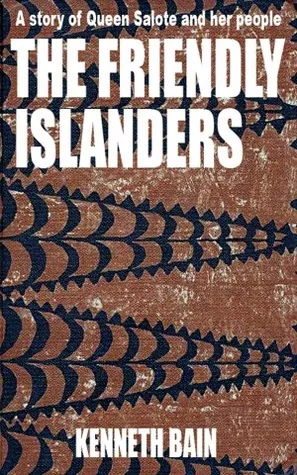The Friendly Islanders
By (author): "King Taufa'ahau Tupou IV, Kenneth Bain"
Publish Date:
July 1st 1993
ISBN13Tonga
AsinThe Friendly Islanders
Original titleThe New Friendly Islanders: The Tonga of King Taufa'Ahau Tupou Iv/Published to Mark the Occasion of the Seventy-Fifth Birthday of the King on 4 July
"An extremely well-written book, full of good stories and characters."The Australian Bulletin’s Book Of The Week"An important insightful source about contemporary Tonga written with charming simplicity and wry humour. There is a sharp mind at work here, without mockery or cynicism." The Dominion, New Zealand "Bain’s prose has an elegance that is rare in modern non-fiction. He is a writer, not simply a presenter of information. The result is a book that is a joy to read and a timely well-informed study of Polynesia’s last Kingdom." The Christchurch Press, New Zealand "A fascinating read for adventurers and armchair travellers alike." Southern Cross Press "An excellent (and easy) read." Evening Standard, London "Bain’s journey takes us beyond the hackneyed portraits of Pacific paradises and into Eden’s rotten administrative core." The Daily Telegraph, London The Unpacific Pacific:The South Pacific has become a nervously unsettled part of the globe. It is no good pretending, as some do, that it is otherwise. Two military coups in Fiji in 1987 sent shockwaves to every island government. There have been constitutional crises, strikes, riots and/or bloodshed in Vanuatu, New Caledonia, French Polynesia and Papua New Guinea (where there was attempted secession and nearly civil war as well). They will not be the last such occurrences. Notwithstanding the huge ocean distances between tiny pinpoints of land, all are affected in one way or another by events in neighbouring islands and beyond. A great oceanic triangle in the Central and South Pacific embraces three distinct racial, linguistic and cultural groupings: Melanesia to the west, Micronesia to the north and Polynesia to the east. The Maoris of New Zealand represent the southernmost penetration of Polynesia; Hawaii the most northern; and Pitcairn and Easter Island the eastern extremities. Fiji is the crossroads of Melanesia and Polynesia. To the west lie New Caledonia, Vanuatu, the Solomon Islands and Papua New Guinea, all of whose people are black skinned, fuzzy haired and stocky. The Micronesians to the north – Nauru, Kiribati, the Marshall Islands, the Federated States of Micronesia, Palau and Guam – are pale skinned and more spare in build. They are atoll dwellers. Their faces carry visible characteristics of the Philippines and Indonesia. To the east of Fiji lie the two Samoas, Western and American, the Cook Islands, French Polynesia, Niue and the last surviving monarchy in Polynesia, the Kingdom of Tonga. Suddenly it seems that the world is on the doorstep of almost every island capital. The mini-states – independent politically but dependent economically – are the latest playground for big power politics, entrepreneurial adventurism and cheque-book diplomacy, whatever some governments may allege to the contrary. Custom and tradition survive precariously in a region of universal Christian influence and apparent unity, yet with deep sectarian rivalry and fragmentation. Emigration queues and visitors’ visa applications at resident metropolitan missions seem never-ending. Amid all this, the Kingdom of Tonga outwardly remains a steadfast anachronism. Its monarchy and royal family seem not just to be intact but to be energetically expanding their sphere of influence. The constitution is semi-feudal and grandly Victorian. Full parliamentary democracy does not exist. Oligarchy, however, does: an oligarchy of the royal family and the nobility. It is the sovereign’s prerogative to appoint the prime minister and other ministers; but not on the basis of electoral endorsement or parliamentary support. They retain their offices during the sovereign’s pleasure. Which may seem to mean for life, or nearly so. Thus Queen Salote appointed her first son as Premier in 1949; and he, as King, similarly installed his younger brother in 1965. So two royal princely brothers successively headed the Government for forty-two years from 1949 to 1991. Institutionally conservative though it may be, Tonga has flung open its doors to tourism and thus the wider influences of the outside world, good and bad. Except on Sundays when, for example, no aircraft movements are permitted and the churches are full. The country’s apparent stability is seen as an investment attraction, yet there are the usual murmurings of corruption in high places. The public perception is that the King and Crown Prince openly dabble in business enterprises. Similarly, the only royal daughter, Princess Pilolevu, who resided in London as wife of the Tonga High Commissioner from 1989 to 1992. The Crown Prince – articulate, urbane, polished and linguistically versatile..Kenneth Bain
